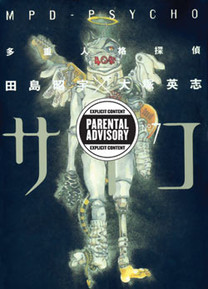Review
by Casey Brienza,MPD-Psycho
GN 7
| Synopsis: |  |
||
Kazuhiko Amamiya has reappeared onboard the very same hijacked plane that Miwa Isono is on…or has he? Her elder sister Machi, while in the lair of the Gakuso Society, learns otherwise: There is a real Amamiya, and he's the man with the horrid facial scar standing right beside her! But when he goes up against the Shinji Nishizono personality inside Tetora, who will emerge victorious? Is original actually better? Moreover, who is the villainous personage on the plane with Miwa, and will she be able to get from him what she most desires in the world? The genetic and psychic fragments within all of these people with the barcodes on their eyes can be merged to reincarnate Lucy Monostone, and his return may be nigh. |
|||
| Review: | |||
If in volume six of MPD-Psycho the plot thickens deliciously, in volume seven it overcooks into a congealed, indigestible mess that one hopes—with perhaps only uncertain confidence—that it will ultimately be salvageable. In fact, unless you happen to be one of those people who cannot look away when confronted with two-page spreads of teenage girls in the nude, you will be hard-pressed to find much that is either creepy or compelling. And if things do not start picking back up soon, you might find it hard to convince yourself to bother coming back. Actually, this volume is, without question, the least violent installment in this extremely violent series so far. The usual dismemberments, decapitations, and disembowelments just are not to be found in abundance here, though there are a decent number of artistically rendered flat black blood splatters. The most memorable scene of violence is of a vaguely self-inflicted sort; the “real” Kazuhiko Amamiya tries to merge with the Shinji Nishizono personality inside of Tetora—with spectacular results. And of course, said results beg the question: If the goal here is to merge a bunch of named personalities together in order to resurrect the genetic perfection that way Lucy Monostone, and there are multiple copies of those aforementioned personalities, then which personalities are the ones that will lead to the desired goal? No answers are readily forthcoming, though you would be excused for wondering if the solution might not have something to do with “our” Kazuhiko Amamiya. Otherwise, this volume is so tedious in its pacing and brackish in its storyline that it's awfully hard to come up with any other intelligent questions to ask about where things are going. One cannot quite shake the feeling that Eiji Otsuka is trying to blind readers with pseudo-science in order to conceal the many ways in which the plot is beginning to flounder. Character-wise, there is not much of note going on either. Of course, there are a couple of new flunkies, shadow operatives working for the government, who will doubtlessly end up as so much cannon fodder later on. The most interesting—and even it strains the bounds of what may be characterized “interesting”—is the relationship with Miwa's status as XX and her vaguely inappropriate, Lolita-like interest in “our” Amamiya. That was not just girlie flirting; it was her superhuman side demanding its rightful due. As always, Sho-U Tajima's artwork is cool and clean—elevating acts of murder to sublime, aesthetic cruelty. Content aside, it is elegant, sensual, and instantly, stylistically recognizable. But in spite of the confident, fluid lines, there is a paradoxically hard-edged quality to the buildings and bodies portrayed. The inky black and stark white, with little grey tones utilized, highlights the series' affective frigidity. Volume seven once again dials down the extremes of violence, and it is possible to view this as a good thing. While an up close and personal exploration of the contents of a woman's skull or a man's abdomen is admittedly a pretty neat trick, any master of the horror genre can tell you that the scariest thing in the world is that which is not shown. Too bad that this effect does not, as it does in volume six, ratchet up the narrative tension. In volume seven, it's starting to become tiresome. MPD-Psycho has not had an easy time of things in Japan. After a stint in Shounen Ace, it moved to Comic CHARGE in 2007, but now Comic CHARGE has been canceled. The manga is still ongoing, with thirteen Japanese language volumes currently available. Hopefully, it will not be compromised further by economic turbulence in the manga industry…but few series manga two such moves unscathed, let alone one, and this reviewer at least worries that the series will never reach a fully satisfactory conclusion. Still, it has certainly been a lot of fun this far, so one might as well try one's utmost to enjoy the ride while it lasts. |
| Grade: | |||
|
Overall : B+
Story : B
Art : A
+ Sublime, aesthetic cruelty embodied in a perfect marriage of story and art. |
|||
| discuss this in the forum (7 posts) | | |||
| Production Info: | ||
|
Full encyclopedia details about Release information about |
||